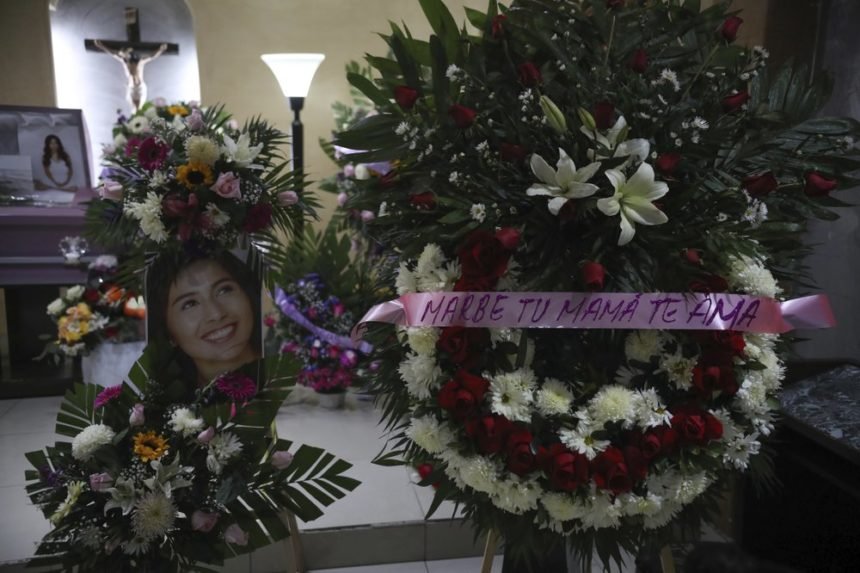Friends say Tijuana woman was stalked even after death

MEXICO CITY (AP) — The man was obsessed with Marbella Valdez. He sent her gifts, bought food for her friends. Prosecutors say he even planted a tracking device on her car.
And when the 20-year-old law student’s body, beaten, bound and strangled, was found at a Tijuana garbage dump, he approached police to demand the case be solved. He even turned up at her funeral bearing a floral arrangement and wearing a T-shirt with her photograph and the feminist slogan “Not One More Woman” printed on it.
A week later, he was arrested and charged with her murder.
The man — identified by Mexican rules only by his first name, Juan — has insisted on his innocence.
But friends and family say Marbella Valdez was stalked in life and even after death.
Authorities in the border state of Baja California confirmed that the suspect is the man seen in photographs depositing flowers on Marbella’s coffin as it was lowered into the ground on Feb. 14.
By that time, Marbella’s family already believed he was the one who killed her, but they couldn’t say a word.
“And the guy showed up at the funeral and we had to shut our mouths, which was the hardest thing in the world,” said William H. Messick, a San Diego software executive who has run a self-funded non-profit since 2014 to help youngsters like Marbella as they age out of orphanages. While he never legally adopted her, Marbella considered him a father.
“I wanted to throw up every time I saw him, I wanted to kill him,” Messick said. “And we’re getting thrown under the bus. In the media, people are like, ‘Oh my God, why did they let him go to the funeral?’ We had no choice, we had to play along, otherwise he would have fled, or he would have killed Brenda (Marbella’s adoptive sister).”
The pair, Messick and Brenda Villarreal, had done much of the investigation after she disappeared on Feb. 5. Within a few hours, Brenda got a message from her: Someone had apparently taken Marbella’s phone and sent out messages impersonating her.
“We knew it wasn’t her when I first read a message I got,” Brenda said. “It said, ‘I feel bad, I’m going to see the dr,’ and my sister doesn’t write that way.”
Marbella had grown up in a Tijuana orphanage and Messick paid her rent and ensured she went to school. In return, he expected she would go to church and not allow any men, even him, into her apartment.
Juan had started pursuing Marbella, a 20-year-old law student, since mid-2019, targeting her mainly at her day job as a pump attendant at an all-female gas station in Tijuana.
He had been trying to win Marbella’s trust for months, giving her chocolate, flowers, stuffed animals and other gifts.
“I would ask her and she just kind of laughed it off, she didn’t really take it seriously.” Messick said. “I’m like, ‘Are you interested in this guy?’ And she’s like, ‘Oh no, of course not.’ ... Constantly there was more stuff in her apartment, and like a giant teddy bear. She just always laughed it off. She thought it was hilarious, and thought it was not a big deal.”
Juan would show up to the gas station where she worked, and bring breakfast to all Marbella’s co-workers.
That seemed harmless enough: “He would try to win everybody over , everybody thought he was great,” Messick said.
But a more sinister side gradually emerged. Messick said Juan seemed always to know where Marbella was. After his arrest, police found a GPS locating device to Marbella’s car, and Messick said he believed the man may have taken a copy of the keys to her apartment.
Marbella disappeared on Feb. 5 and her family quickly managed to get into her messaging accounts. They were later able use them to determine her location after she disappeared, which matched Juan’s location.
“This guy Juan, when we hacked her WhatsApp account, he noticed,” Messick recalled. “He called and said, ‘Oh, this is interesting, her WhatsApp account is active.’ It wasn’t like, ‘Oh my God, she’s connected.’ It was like, ‘No, it’s interesting.’ ... And like 2 hours later, that’s when her body showed up. I think he realized we were on to him.”
The suspect once reportedly worked as a sort of civilian intern for a police forensic office and liked to present himself as a former cop, though he never was one. He also approached police to find out information on their investigation of Marbella’s death, according to prosecutors quoted by the newspaper El Imparcial.
State prosecutors said they had more evidence when they arrested Juan on Feb. 21, including GPS location data from his phone showing he was with Marbella after she disappeared and his DNA was found under the dead woman’s fingernails.
For three days after her disappearance, relatives had been telling police they suspected Juan of taking her; Brenda believes that if they had searched Juan’s house, they could have found her alive. “I told them, if you had acted, my sister might still be alive,” Brenda said
“The level of suffering is so many degrees, it’s so painful,” Messick said, days after the initial arraignment. “The guy was smiling at the hearing.”